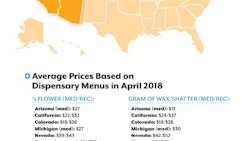As of May, medicinal cannabis was legal in 30 states plus the District of Columbia, with nine states and D.C. having legalized recreational cannabis. At the same time, it remains federally illegal. That dichotomy translates into great uncertainty for those who make a living cultivating, processing or selling the plant and creates a regulatory vacuum.
While the federal government routinely issues safety regulations related to food and drugs, transportation, occupational health, consumer products and myriad other issues, those regulations interpret the will of Congress in passing related legislation. Without federal legislation legalizing marijuana, there is no Congressional intent to interpret. Therefore, regulations from the Food and Drug Administration (FDA), the U.S. Drug Enforcement Administration (DEA) and any other federal agencies with potential stakes in the cannabis industry are virtually non-existent.
Because of that void, many of the most reputable licensed cannabis companies are taking it upon themselves to establish national standards in lieu of federal guidance. The process became a bit more complicated earlier this year when Attorney General Jeff Sessions rescinded the Cole Memo, which previously provided the industry with some level of understanding regarding the federal government’s priorities.
Still, many licensed cannabis companies feel they just need to abide by state law and regulation. That view is short-sighted. Other growers, processors and dispensary owners are taking control of their destinies, however. By going beyond what is required of them at the state level, these leading, licensed businesses will demonstrate to banks, insurance companies and other professional organizations that they are trustworthy. Simultaneously, they will pro-actively demonstrate to the DEA, FDA, Department of Justice (DOJ) and other relevant government agencies that they are doing everything that they can, notwithstanding the uncertainty that exists, to align with the priorities of our federal government to protect its citizens.
How? Those interested in being uber-compliant are working with self-regulatory organizations (SROs) to anticipate the priorities of the federal government, including prohibiting youth use, diversion and drugged driving. It’s a testament to true democracy in action. (See below for more on SROs.)
The Case for Self-Regulation
Regulators often look to the success of an industry’s SRO when deciding how the government will regulate that industry.
For cannabis, a window of opportunity still exists for the industry to determine its own destiny, by establishing strong national standards that address critical issues such as financial record-keeping and transparency, responsible marketing, prevention of youth use and drugged driving, lab testing best practices and more. Such action would elevate the legitimacy of the SRO’s members in the eyes of regulators and business service providers alike, making it easier for members to access banking, investment capital and other professional services necessary for their companies to keep growing.
A cannabis industry SRO that demonstrates a good faith effort to hold its members to rigorous operational standards could influence future federal regulation.
As an example, look at the FDA’s recent enforcement action against e-cigarette manufacturers. It was predictable that the FDA would crack down on nicotine devices that appeal to minors. Because it was predictable, it was also avoidable. If e-cigarette manufacturers had voluntarily done more to prevent youth use, the FDA would likely have taken a different approach. Instead, e-cigarette manufacturers find themselves producing documents pursuant to a formal request from the FDA. And it’s likely to get much worse for them as federal regulators set their sights on low-hanging fruit.
It’s for all these reasons that the National Association of Cannabis Businesses (NACB)—an SRO—was formed last year.
Developing Standards
The NACB has built a team of former federal regulators, bank executives, anti-money-laundering experts and successful cannabis executives who are uniquely positioned to develop national standards that can withstand government scrutiny. The NACB is developing those standards in partnership with its member organizations, including Green Thumb Industries (see the cover story in this month's issue), Cresco Labs, Aunt Zelda’s, PharmaCann, ForwardGro, Dixie and others.
Dialogue between NACB leaders and its members leads to identifying issues to be tackled by the SRO, and the SRO then recruits subject matter experts to bring deep knowledge of the issues to the discussion. Next, NACB lawyers draft an outline of a standard by critically examining state laws around the country. In doing so, the NACB looks at the most effective methods for protecting the public while also recognizing the burdens regulations place on member businesses. The NACB’s standards may go beyond state laws if doing so is required to protect the public, but they may be less burdensome than state laws if those laws have proven to be ineffective or unnecessary.
After an initial standard draft is ready, it is circulated to member companies along with a discussion guide. The NACB then spends hours with members, discussing the intricacies of the proposed standard, soliciting and receiving feedback, moderating debate on key provisions and ultimately voting on the end product.
Once passed, the draft standard is published publicly for a one-month notice and comment period. Much like the way that the Office of Management and Budget puts out a notice in the federal register for comment on regulation, the NACB posts its draft standard on its website (NACB.com) and pro-actively seeks additional comments from experts and the cannabis community at large.
Feedback is synthesized, the SRO’s members determine what relevant comments to incorporate, and ultimately, a final vote for standard adoption occurs.
Once a standard becomes final, it will act as a voluntary operating rule for NACB member companies; however, ongoing membership in the NACB is contingent upon adhering to NACB standards.
Industry Benefits
NACB members distinguish themselves from others in the industry as superlatively compliance-focused. The standards that the NACB are developing in partnership with members can be useful, however, to the cannabis community at large. NACB posts the standards publicly, and anyone can follow them. But, without an enforcement, they are just pie-in-the-sky standards; NACB members are held to the higher standard, and we make sure that members are walking the walk.

























